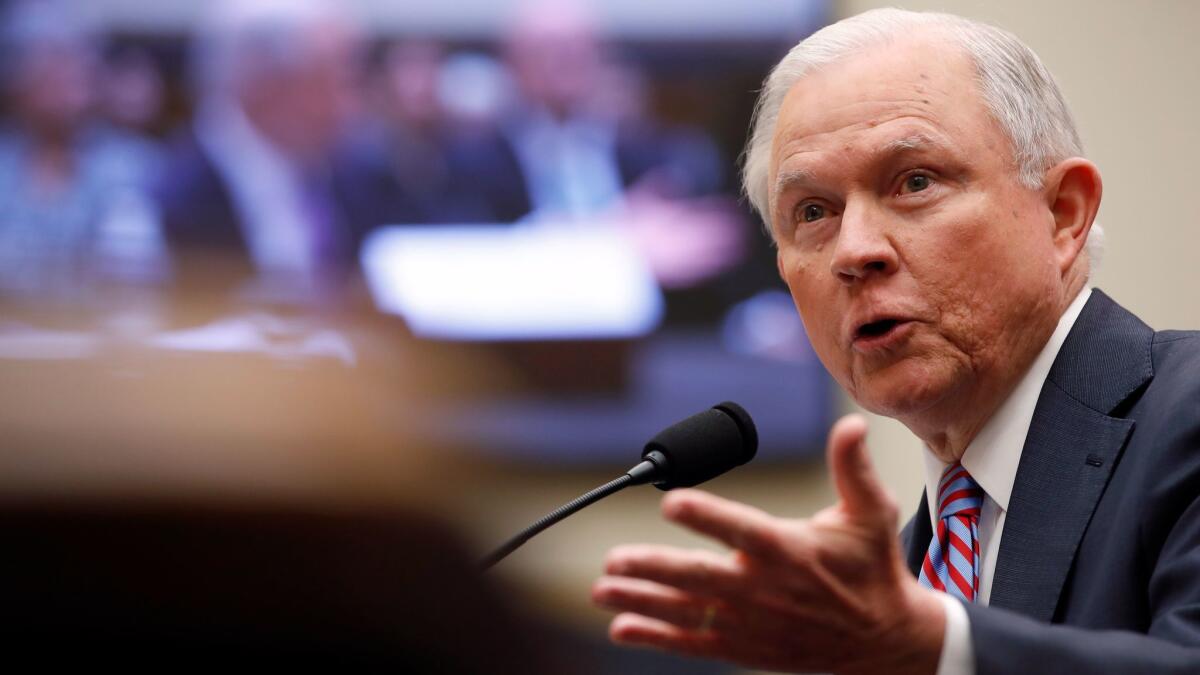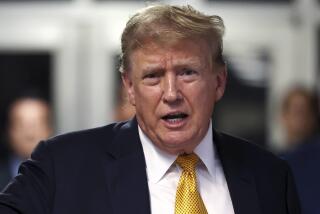Atty. Gen. Jeff Sessions angrily denies lying to Congress about Trump campaign Russia contacts

Reporting from Washington — Atty. Gen. Jeff Sessions repeatedly denied Tuesday that he deliberately misled or lied to Congress about the Trump campaign’s multiple contacts with Russia, saying he forgot that two aides told him about their meetings with Russian government officials during the 2016 race.
In an often-contentious House Judiciary Committee hearing, Sessions sparred for more than five hours with Democrats, who faulted him for changing his story each time he has testified under oath before Congress, and some Republicans, who pushed him to appoint a second special counsel to investigate Hillary Clinton.
Sessions grew visibly angry at times, insisting again and again that he “always told the truth” as he recalled it, even as he confirmed for the first time that an aide offered to help arrange a meeting between Trump and Russian President Vladimir Putin last March. Sessions said he “pushed back” against the offer.
“In all of my testimony, I can only do my best to answer all of your questions as I understand them and to the best of my memory,” he said.
“But I will not accept, and reject accusations, that I have ever lied,” he added. “That is a lie.”
The nationally-televised hearing was the latest sign of how last year’s bitter presidential campaign has yet to recede. Harsh questions about the Democratic nominee’s alleged misdeeds collided with national security concerns of whether President Trump’s current or former aides helped Russia meddle in an American election — the focus of a special counsel investigation led by former FBI Director Robert S. Mueller III.
Sessions held firm against Republicans who pressed him to swiftly appoint another special counsel to focus on Clinton. Senior prosecutors at the Justice Department were reviewing the record and it would “be done without political influence,” he said.
After Rep. Jim Jordan (R-Ohio) laid out a long list of allegations that he said indicated wrongdoing, Sessions responded sharply. “I would say ‘looks like’ is not enough basis to appoint a special counsel,” he said.
Rep. John Conyers of Michigan, the House committee’s top Democrat, said the allegations against Clinton — which chiefly involve her use of a private email server as secretary of State, fundraising for the Clinton Foundation, and an Obama administration decision in 2010 to approve sales of uranium to a Russian company — have been “carefully examined and completely debunked” and said the threat of jailing political opponents after an election is something that would happen in “a banana republic.”
The often testy back-and-forth on Russia largely echoed Sessions’ three previous appearances on Capitol Hill this year, creating more heat than light as lawmakers confronted Sessions with his previous statements and other evidence that contradicted his claims, and the attorney general insisting he did “not recall” dozens of times in response.
“I have been asked to remember details from a year ago, such as who I saw on what day, in what meeting, and who said what when,” he said.
He blamed his faulty memory on the political and organizational maelstrom of Trump’s insurgent presidential campaign. The four-term senator from Alabama joined Trump’s side early on and became his top foreign policy advisor.
“It was a brilliant campaign in many ways,” he said. “But it was a form of chaos every day from Day One. We traveled all the time, sometimes to several places in one day. Sleep was in short supply.”
Sessions recused himself from overseeing Mueller’s investigation in March because of his role as Trump’s campaign advisor — and he said in January that he shouldn’t supervise a Clinton investigation for the same reason.
But in the House hearing, he had to again revise his answers about his own meetings with Russia’s then-ambassador in Washington, as well as what he knew about other campaign aides’ meetings with Russians in London and Moscow.
During his Senate confirmation hearing in January, Sessions denied that he had met any Russians during the campaign. It later emerged that he had met three times with the Russian ambassador, including once in his Senate office for about 50 minutes to discuss Ukraine and other issues, he said Tuesday.
He said he stood by his initial denial because he thought he was being asked about improper contacts, and that his meetings with the Russian ambassador were not improper.
Last month, Sessions told another Senate hearing that he was not aware of any campaign aides who might have met with Russian officials, repeating a claim he had previously made to Congress.
On Oct. 30, however, court papers in the criminal case against George Papadopoulos, a campaign foreign policy aide, said that he bragged about his Russian connections at a meeting last March 31 with Trump, Sessions and other aides at the Trump Hotel in Washington.
According to the court documents, Papadopoulos offered to help set up a meeting between Trump and Putin — and that Sessions quickly shut down the discussion.
“I pushed back, I would say it that way,” Sessions said Tuesday, saying he only remembered the incident after reading news reports about Papadopoulos.
“I believe that I wanted to make clear to him that he was not authorized to represent the campaign with the Russian government, or any other foreign government, for that matter,” he said.
Another campaign aide, Carter Page, told the House Intelligence Committee this month that he had told Sessions after a Capitol Hill dinner of his plans to visit Moscow last June. Sessions said Tuesday that he didn’t remember Page informing him, but did not dispute that he had — and that it did not establish wrongdoing.
“Am I supposed to stop him from taking a trip?” Sessions asked. Page told the Intelligence Committee that he had a private discussion with one of Russia’s deputy prime ministers and several lawmakers while he was in Moscow.
Rep. Ted Deutch (D-Fla.) repeatedly asked Sessions if Trump had the authority to pardon anyone potentially caught up in the Russia investigation, including members of the president’s family, former campaign aides and current White House advisors.
“I believe the president has the power to pardon, no doubt about that,” Sessions said. Pressed to explain, he added: “The attorney general should not be giving legal opinions from the seat of his britches.”
So far, Trump’s former campaign manager, Paul Manafort, and his top deputy, have been charged with fraud, conspiracy and money laundering. A third campaign aide, Papadopoulos, has pleaded guilty to lying to the FBI. Other indictments are expected.
While the Russia investigation dominated the hearing, Sessions also faced tough questions about other controversies at the Justice Department.
He defended voter identification laws and defended his new harsh sentencing policies that some say have been wielded far more harshly against African Americans accused of drug offenses.
Rep. Karen Bass (D-Los Angeles) challenged Sessions to explain an FBI report made public in October that said “black identity extremists” were intent on killing law enforcement officers. She said all the groups named were from decades ago, and asked him if any such groups existed today. He said he did not know of any.
He said he was aware of no similar report on white extremist groups, such as the white supremacists who rallied in Charlottesville, Va., in August. Later, he said he did not have a senior staff member who is African American, and said Trump has appointed just one African American as a U.S. attorney.
Sessions also declined to defend Roy Moore, the Republican candidate in the special election to decide Sessions’ old Senate seat in Alabama. Moore now faces charges of being a serial predator of teenage girls, with five women coming forward to describe their encounters.
“I have no reason to doubt these young women,” he said of Moore’s accusers, adding that he would consider whether the Justice Department should open an investigation. “We would do our duty,” he said. He said he has followed advice from the department’s ethics lawyers and avoided any involvement in the campaign.
More to Read
Sign up for Essential California
The most important California stories and recommendations in your inbox every morning.
You may occasionally receive promotional content from the Los Angeles Times.












